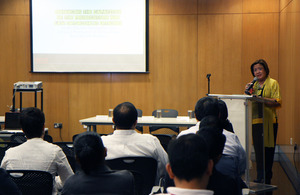Department of Justice and Philippine National Police enhance inter-agency cooperation on human rights
The Embassy-funded project seeks to improve the investigation and prosecution of torture cases and strengthen human rights in the Philippines.

DOJ Secretary Leila de Lima during a reception on Inter-Agency Cooperation on Enhancing Investigation and Prosecution of Torture Cases
The Philippine National Police (PNP) and the Department of Justice (DOJ) are working together with non-governmental organisation, the Medical Action Group (MAG) in a project funded by the British Embassy to improve the investigation and prosecution of torture cases and strengthen human rights and the rule of law in the Philippines.
A reception on Inter-Agency Cooperation on Enhancing Investigation and Prosecution of Torture Cases held on 21 March was the culminating activity of this project. This is in response to one of the recommendations following the project, which showed that closer cooperation between the relevant governmental agencies is needed in order to improve the prosecution of torture cases.
Representing the British Embassy, First Secretary Steph Lysaght said:
These sessions have been remarkable. They show the clarity and strength of the Police and Government’s intentions to root out any instances of bad practice and to have them instil the highest of professional standards. The joint working and skills the front line police officers and prosecutors have learnt and the relationships they’ve built can help drive positive change across their organisations.
Justice Secretary Leila de Lima shared a roadmap to further improve the prosecution of torture cases, noting that the only way forward is to acknowledge that tortuous ways have no place in civilised society. She explained that forensic evidence must be strengthened, given that a case can be weakened if it only relies on testimonial evidence.
DOJ Secretary de Lima said:
In the executive we are further enhancing institutional mechanisms to address grave human rights violations.” She added Administrative Order (AO) 35 issued last November is a step in the right direction, and cited the need for close inter-agency collaboration for the full adoption of the operational guidelines of AO 35, emphasising the harmonisation of efforts in like-minded institutions. She sees a need for even further training to enhance specialisation of prosecutors and investigators in dealing with human rights violations. Also included in her roadmap is a road show that will ensure that human rights legislation will be cascaded to all sectors of society. With these efforts she hopes to see a significant increase in the conviction rates of human rights violations.
PNP Human Rights Affairs Office (HRAO) Chief Nestor Fajura emphasised that torture is not a tool for investigation, and has no place in the investigation process of the Philippine National Police. He cited the project spearheaded by MAG for helping the PNP coordinate better and faster with medico-legal experts, a crucial part of the investigation.
Investigators from the PNP and prosecutors from the DOJ underwent a series of training to boost their capacity to preserve and process physical and medical evidence that should have probative value in court. This training, for the first time, of investigators and prosecutors is a crucial process in providing the PNP and DOJ common ground and framework to work on the application of international standards for effective investigation and the successful prosecution of torture cases in the country.
Training has been done in different parts of the country covering all the regions from Luzon down to Mindanao in six strategic sites – Manila, Baguio, Cebu, Cagayan de Oro, Zamboanga and Davao with a total of 249 prosecutors, PNP and NBI investigators and medico-legal officers.